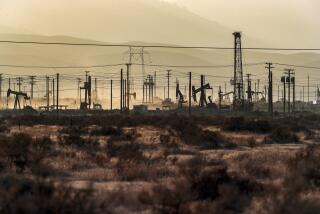Nevada Legislators Say Plan to Bury Nuclear Waste in State Is Unlawful
- Share via
LAS VEGAS — In the strongest action yet to derail a federal plan to bury 70,000 metric tons of commercial nuclear waste in a proposed underground repository 110 miles north of here, the Nevada Legislature has approved a bill declaring the project unlawful.
A spokesman said Gov. Bob Miller will sign the measure, thereby sending “a united strong message to Washington that . . . we will fight (the proposed repository) tooth and nail.”
Many Nevadans do not want the facility at Yucca Mountain because they fear environmental consequences. They also do not like the idea of other states shipping nuclear waste to their arid and sparsely populated state, which produces no commercial nuclear waste of its own.
The Legislature had earlier passed two resolutions against the repository, but the measures did not have the force of law.
Although the Federal Nuclear Waste Policy Act permits a state to refuse location of such a facility within its boundaries, it also allows Congress to override a state veto with a two-thirds vote of its members.
As a result of Wednesday’s action, however, Nevada officials say they may refuse necessary state permits for a congressionally authorized five- to seven-year study to determine whether Yucca Mountain would be a satisfactory site for waste from nuclear power reactors in about 40 states.
The study was about to get under way and is a necessary precursor to establishing the repository. There was speculation from both federal and state authorities Thursday that protracted litigation could now impede even the study.
The location of what would be the nation’s only permanent facility for the storage of nuclear waste has long been the subject of bitter controversy. One state after another has told the federal government to take the project elsewhere.
In 1987--despite recommendations from the U.S. Department of Energy that sites in Texas, Washington and Nevada be studied--Congress ordered that Yucca Mountain be the only site studied.
Meanwhile, Nevada environmentalists, long resentful because the federal government owns a high percentage of the state’s land, began rallying opposition to putting the repository in their state.
The environmentalists were soon able to get the attention of politicians. The state’s congressional delegation also has voiced its unanimous opposition to the project.
In Washington on Thursday, Philip Garon, a spokesman for Energy Secretary James D. Watkins, said: “We will have to see how this bill is actually applied by the state.
“But the state may try to deny us the air-quality and surface-disturbance permits we need to test the viability of Yucca Mountain,” he said. “Even though this would conflict with Congress’ authorization of the study and normally federal law would take precedence under the supremacy clause, getting these permits could entail substantial litigation.”
Garon said the delay would be unfortunate because pools now used to store spent fuel rods at the sites of reactors across the country are becoming congested.
The Nevada Assembly earlier voted 38 to 3 to ban use of Yucca Mountain. The vote in the state Senate on Wednesday was closer. Eleven senators voted for outlawing the facility, three opposed outlawing it and seven abstained.
Two Las Vegas legislators who voted no were castigated Thursday in an editorial in the Las Vegas Sun. “Why anyone in their right mind from Southern Nevada would vote in favor of a nuclear dump is a mystery,” the editorial said in part.
The Legislature’s action was hailed by Pete Mastin, a founder of the environmentalist group Nevadans Against Nuclear Dumping, as “a tremendous victory.”
“Nevada’s legal defense against federal usurpation of our state’s rights has now been immeasurably strengthened,” he said.
Former Gov. Grant Soyer, chairman of the Nevada Nuclear Projects Commission, said he believes that state officials would be in violation of the law if they granted a water permit to the Energy Department in connection with Yucca Mountain.
More to Read
Sign up for Essential California
The most important California stories and recommendations in your inbox every morning.
You may occasionally receive promotional content from the Los Angeles Times.










